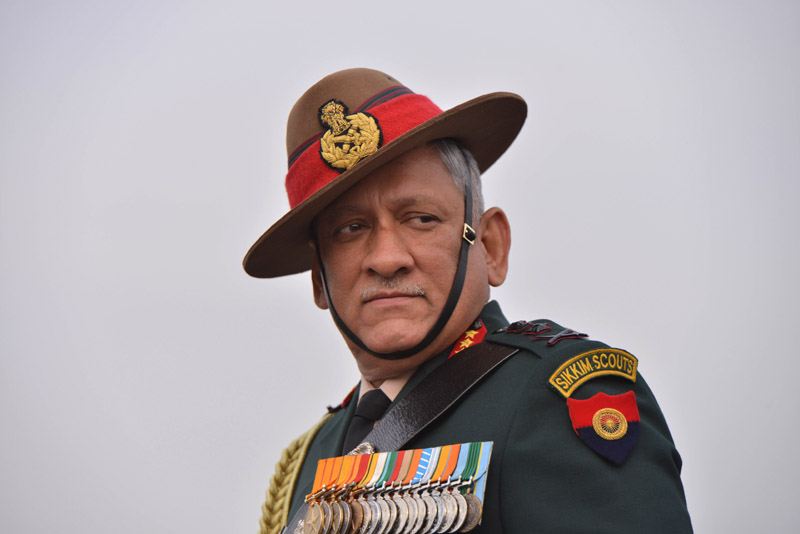 Bipin Rawat Dies
Bipin Rawat Dies General Bipin Rawat: Highlights of his outstanding career
New Delhi/UNI: General Bipin Rawat, who died in an IAF chopper crash at Coonoor in Tamil Nadu on Wednesday, rose the ranks to become the first ever Chief of Defence Staff of the three services, after serving as the 27th Chief of Army Staff for three years.
General Rawat was commissioned in the Fifth Battalion of Eleven Gorkha Rifles in December 1978, from Indian Military Academy, Dehradun, where he was awarded the 'Sword of Honour'.
In his career in the Indian Army spanning over four decades, General Rawat commanded an Infantry battalion along the Line of Actual Control in the Eastern Sector; a Rashtriya Rifles Sector and an Infantry Division in the Kashmir Valley, and a Corps in the Eastern theatre and the Southern Command.
An officer with vast experience in high altitude warfare and counter insurgency operations, the General had also served at Indian Military Academy, Dehradun and at Army War College, Mhow.
As a Major, he had commanded a company in Uri, Jammu and Kashmir and as a Colonel, he commanded the 5th battalion of 11 Gorkha Rifles, in the Eastern sector along the Line of Actual Control at Kibithu.
.jpg)
After being promoted as a Brigadier, he commanded 5 Sector of Rashtriya Rifles in Sopore, and later went to command a multinational Brigade in a Chapter VII mission in the Democratic Republic of Congo (MONUSCO), where he was twice awarded the Force Commander's Commendation.
With his promotion as a Major General, Rawat took over as the General Officer Commanding 19th Infantry Division (Uri). As a Lieutenant General, he commanded III Corps, headquartered in Dimapur before taking over the Southern Army in Pune.
He also held staff assignments, including an instructional tenure at the Indian Military Academy (Dehradun), General Staff Officer Grade 2 at the Military Operations Directorate, logistics staff officer of a Re-organised Army Plains Infantry Division (RAPID) in central India, Colonel Military Secretary and Deputy Military Secretary in the Military Secretary’s Branch and Senior Instructor in the Junior Command Wing.
.jpeg)
He also served as the Major General General Staff (MGGS) of the Eastern Command.
After being promoted to the Army Commander grade, Rawat assumed the post of General Officer Commanding-in-Chief (GOC-in-C) Southern Command on Jan 1, 2016.
After a short stint, he assumed the post of Vice Chief of Army Staff on September 1, 2016.
General Rawat had taken over as the 27th Chief of Army Staff on Dec 31, 2016, months after the surgical strike done in response to an attack on an Army camp in Uri.
He also served as 57th and last Chairman Chiefs of Staff Committee.
He took charge as India's first Chief of Defence Staff on Jan 1, 2020.
Born in Pauri, Uttarakhand, he went to Cambrian Hall School in Dehradun, and St Edward's School, Shimla.
.jpg)
His father Laxman Singh Rawat was from Sainj village of the Pauri Garhwal district and rose to the rank of Lieutenant General in the Indian Army.
An alumnus of Defence Services Staff College, Wellington, the Higher Command & National Defence College Courses, General Rawat had been awarded for gallantry and distinguished service with the Uttam Yudh Seva Medal, Ati Vishisht Seva Medal, Yudh Seva Medal, Sena Medal, Vishisht Seva Medal and COAS Commendation on two occasions and the Army Commander’s Commendation.
He had also attended the Command and General Staff College (CGSC) course at Fort Leavenworth, Kansas, US.
Academically inclined, General Rawat had also authored numerous articles on ‘National Security’ and ‘Leadership’, which have been published in various journals and publications. The CDS was also awarded an M Phil in Defence Studies from Madras University, and held a PhD from Chaudhary Charan Singh University.
Support Our Journalism
We cannot do without you.. your contribution supports unbiased journalism
IBNS is not driven by any ism- not wokeism, not racism, not skewed secularism, not hyper right-wing or left liberal ideals, nor by any hardline religious beliefs or hyper nationalism. We want to serve you good old objective news, as they are. We do not judge or preach. We let people decide for themselves. We only try to present factual and well-sourced news.







